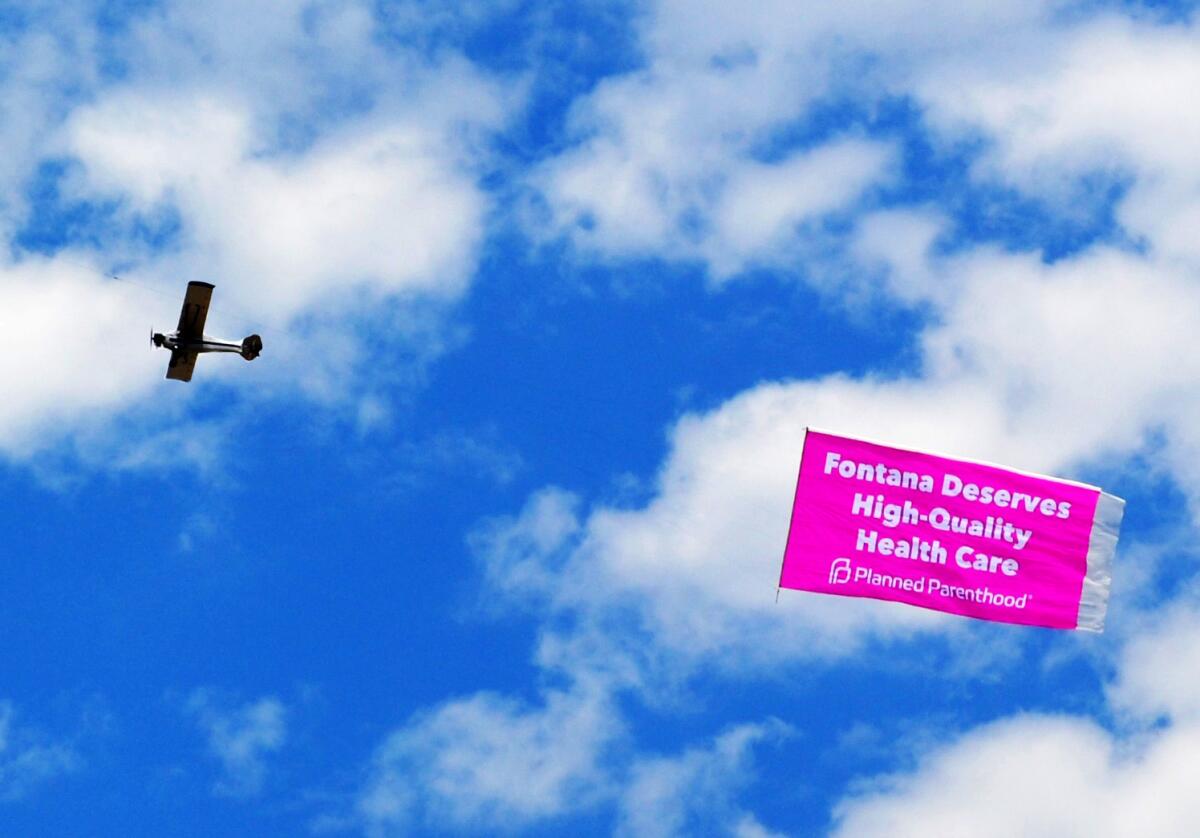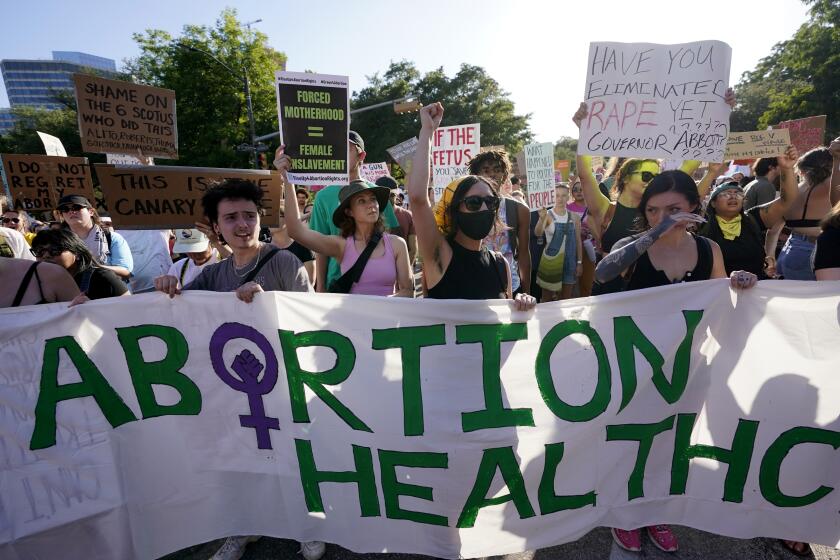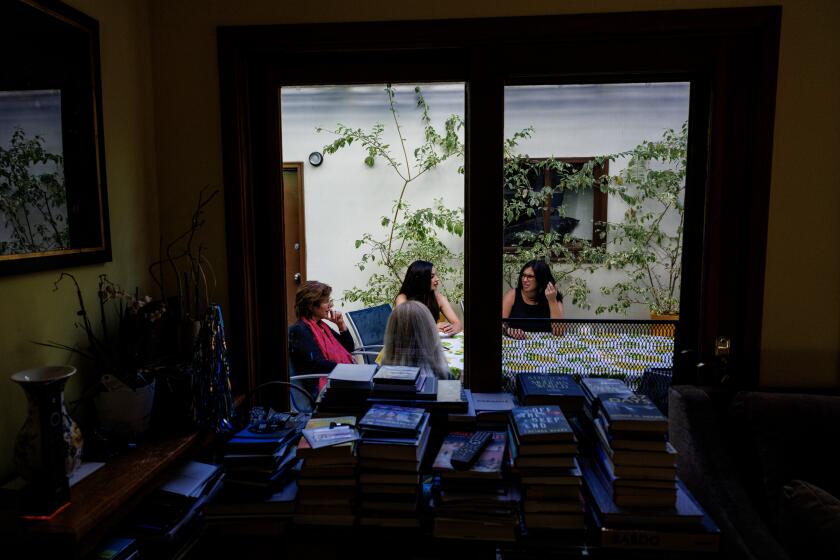As Democrats work to make California a haven for abortion access, some cities are pushing back

- Share via
The Fontana City Council meeting seemed mundane. With little debate, council members last summer unanimously voted to halt certain building permits in a stretch of downtown, allowing only entertainment-related development and citing a need to boost the local economy.
But one business that was planned for that city corridor in San Bernardino County and subsequently blocked by the new emergency ordinance stood out: a Planned Parenthood clinic.
While Republican Mayor Acquanetta Warren and council members voiced concerns about parking and generating more sales tax revenues — not about their stances on abortion — their new zoning rules and subsequent rejection of the clinic have drawn protests, triggered a lawsuit and inspired state legislation.
A bill that California lawmakers are expected to consider this month aims to make it easier to build reproductive health clinics. Debate over the legislation comes as out-of-state abortion seekers travel to California for care after the U.S. Supreme Court decision striking down federal abortion protections.
A decision by the Arizona Supreme Court that aims to impose a near-total abortion ban in the state has put Southern California providers on alert.
Abortion rights advocates point to Fontana as an example of how local opposition can undermine California’s progressive abortion access laws, which are among the strongest in the nation. Plans to build abortion clinics have also been hamstrung by local officials in Visalia and Beverly Hills, where some opponents cited zoning and permitting concerns.
Assembly Bill 2085 by Assemblymember Rebecca Bauer-Kahan (D-Orinda) would streamline the construction process for community health clinics and exempt them from parts of the California Environmental Quality Act — a landmark development law that has long been lambasted as a tool that can be abused to block construction.
If the bill is approved by the Legislature and Gov. Gavin Newsom, construction of reproductive health clinics would be permitted anywhere that certain other healthcare offices, retail stores and parking spaces are allowed, without having to clear hurdles required of other development projects.
Although the bill pertains to all community clinics, Bauer-Kahan said in a statement Tuesday that it’s abortion providers that are being disproportionately rejected without justification and that “streamlining the opening of these clinics in healthcare deserts is a critical step” to fill remaining reproductive healthcare gaps in California.
“Our state cannot promise abortion rights on the one hand but deny access on the other,” she said.
But it’s unclear whether the zoning bill can stave off the power of public pressure in some California communities, as activist groups such as the Survivors of the Abortion Holocaust increase their efforts to protest construction plans.
“Planned Parenthood is not healthcare. They called it a health clinic. It is a murder mill,” Edgar Alvarez, a member of the Survivors of the Abortion Holocaust said outside Fontana City Hall last month. “Abortion is murder and we need to act like it.”
The same organization recently opposed an abortion clinic in Beverly Hills, successfully halting construction there. The city of Beverly Hills is now being sued by DuPont Clinic, an abortion provider that planned to open there last year, alleging that officials helped shut down construction plans after hearing from relentless critics. The city has denied the allegations.
The campaign by an antiabortion group to block the opening of a specialized clinic in Beverly Hills may offer a playbook for similar efforts in other cities and states.
The Fontana City Council reaffirmed its decision to halt construction of Planned Parenthood at a meeting last month, voting 4 to 1 to extend the building prohibition for another year. More than 40 people lined up to speak for and against abortion rights — including some from out of town — and a plane sponsored by Planned Parenthood flew overhead waving a hot pink banner that read, “Fontana deserves high-quality health care.”
Still, City Council members managed to avoid saying the word “abortion” at all.
“The ordinance is neither illegal nor targeted toward blocking the construction of a Planned Parenthood health center. Rather, it is part of a broader, thoughtful community planning effort to promote economic development throughout the city and contribute towards the revitalization of downtown Fontana,” Warren said at a meeting July 23.
Planned Parenthood of Orange & San Bernardino Counties is suing the city of Fontana, alleging the construction moratorium is unconstitutional because it prohibits access to abortion and contraceptives, a right enshrined in the California Constitution by voters in 2022.
“The city may not do indirectly what it cannot do directly,” the lawsuit states.
Ramona Thomas, general counsel for Planned Parenthood of Orange & San Bernardino Counties, said Fontana leaders have “put their own political agendas above the needs of the residents of their community,” pointing out that the organization offers other healthcare in addition to abortions, including cancer screenings, breast exams and sexually transmitted disease testing.
Planned Parenthood said it provided $3 million worth of services to low-income patients in Orange and San Bernardino counties in 2023, totaling 260,000 medical visits.
“The city’s just making it harder. They’re making it take longer. They’re making it less convenient,” Thomas said about abortion access. “They’re just adding to the burden and adding to the risk and difficulties that these people have to face as they are trying to receive the healthcare that they desperately need.”
While there are 115 Planned Parenthood facilities statewide, in addition to some independent clinics, 40% of California counties do not have an abortion clinic.
Bauer-Kahan’s bill poses questions about local control in a massive, diverse state and could draw concerns when it comes to the power cities and counties have over development in their neighborhoods.
It also poses a test for Newsom, a Democratic champion of abortion rights, who has in some instances heralded local discretion as a crucial component of democracy and at other times waded into city and county affairs to override decisions in Republican enclaves of the state that test California’s liberal policies, including school LGBTQ+ policies.
The League of California Cities supports the bill but only if it is amended to allow more local flexibility over factors such as distance requirements between clinics and other facilities “to ensure compatible use.”
Rob Poythress, president of the California Assn. of Councils of Governments, a nonprofit focused on regional policy, said state overreach and a “one size fits all” approach are all too common.
Poythress, a Republican member of the Madera County Board of Supervisors who was endorsed by the California ProLife Council PAC during his run for state Senate in 2018, said the issue is not about abortion but about respect for community input.
“If Sacramento was controlled by Republicans, I wouldn’t like to see them come in and strong-arm on a local level either,” he said. “Whenever they jump in for a specific purpose like this, it’s thuggery. It’s really disturbing.”
More to Read
Sign up for Essential California
The most important California stories and recommendations in your inbox every morning.
You may occasionally receive promotional content from the Los Angeles Times.
















